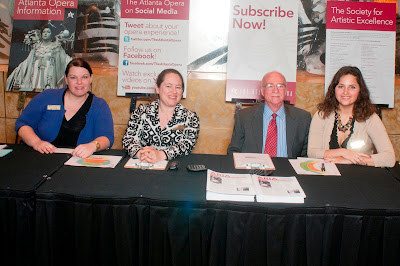* * *
In early February, I began my tutelage in the life lessons of becoming an arts administrator. In case I have managed to hold anyone in suspense for a line, I must confess now, that I am one of the two new interns with The Atlanta Opera. After deliberating and calculating precisely how I wanted to debut my first Atlanta Opera Blog - the first blog of my life- I concluded that I liked the “interview style” of blogging the best. Since I am neither an upcoming opera star nor cultural aficionado, I decided to go boldly where no intern had gone before and ask the kind of mind probing questions that would make Matt Lauer quiver in his loafers. Well… maybe the questions are not all that thought provoking, (Mr. Lauer you and your loafers have been spared), but nonetheless it got me thinking about my past couple of months as a student and intern at The Atlanta Opera. I have learned more about music, and about life, than some of my years in undergraduate school combined. It has completely redefined my musical parameters, and helped me to remember why I made music a special part of my life. So here it goes, my self-interview about what The Atlanta Opera has taught and given me.
 Atlanta Opera Intern Ashli Cribb (far right) helps renew subscribers.
Atlanta Opera Intern Ashli Cribb (far right) helps renew subscribers.What is a typical day at the opera like? To be honest, a typical day for me usually begins and is fuelled by immense amounts of caffeine - a substance we take very seriously here at the opera. Not a day goes by where any employee will refuse a cup of coffee. We as interns begin our day by attending a meeting or two, and then we usually receive our departmental project assignments. Since we work for and with everyone, it is possible that any number of projects will cross our desks. I have attended classes, seminars, helped with ticketing, and was even a light walker for our latest production of Così fan tutte. There is never a dull moment here at The Atlanta Opera.
What is the most interesting thing you have seen since coming to the opera? I think the phenomenon that was Porgy and Bess was pretty amazing. It was incredible to see people of all ages, places, and walks of life come together and enjoy a musical performance. To me, music’s ability to cleverly tie different people and cultures together is what makes it so unique. The energy that surrounded that opera was incredible.
What lessons are you taking with you into your future endeavors?I will definitely be taking the skill sets that I have acquired into my future endeavors. However, if I had to choose the thing that I consider most important, it would definitely be the idea of perseverance. I have come to realize that any task you set your mind to can be achieved if you are willing to keep an open mind and test yourself.
What do you find inspiring about The Atlanta Opera? Having had four years of musical study under my belt I assumed I knew a thing or two about the inner workings of an opera company. Thinking about it now, I have the urge to point and laugh at myself because I could not have been more wrong. I had no idea what an undertaking it was to mount a full scale opera production, and I was completely clueless about how many people work behind the scenes to create the polished finished product. Are you familiar with the phrase, “It takes a village to raise a child?” Well, after working at the opera I am convinced it takes a village and tons of patience to create an opera. When I look around our office it amazes me how supportive and receptive everyone is to each other. I find that everyday my coworkers bring me new inspiration with their sense of dedication, ingenuity, and their genuine love of music.
What is the most interesting part of being an intern? I guess by some standards being an intern may not be the most glamorous lifestyle, but the amount of information that I have learned about opera and about business cannot be paralleled. Every day we have the chance to learn and to meet someone new. I have found that I have slowly begun to rekindle some of my passion for opera. As a freshman in college, I worshiped the stage that opera singers walked on, wished to the song gods above that I could open my mouth and Renee Fleming’s voice would come out, but that never happened. I used to sit and think of nothing but all the glorious things that music had to offer. But like anything else, performing had begun to lose its luster. I had simply grown tired. The mere thought of exerting more energy to keep up exhausted me. It wasn’t until I came to work in Atlanta that the passion for music returned to me. Watching my coworkers utilize their skills and talents breathes new life into my commitment to music.
To my fellow interns, and to all the opera fans out there, I leave you with these words, “Life is one grand, sweet song, so start the music.” ~Ronald Reagan






